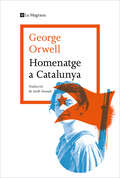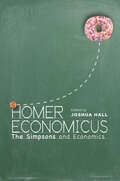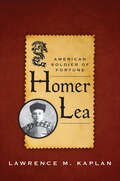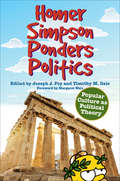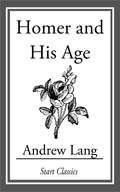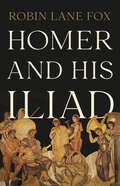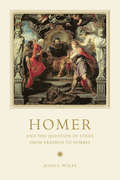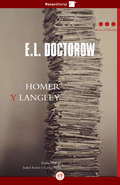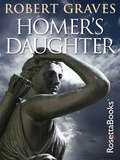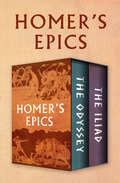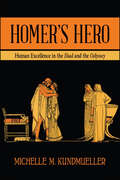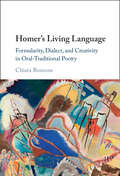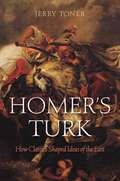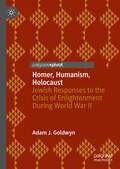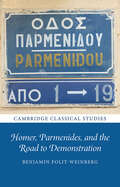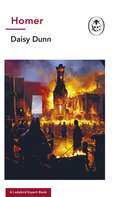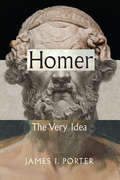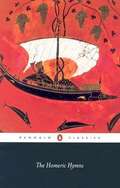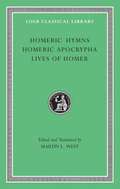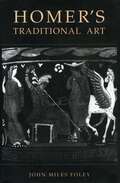- Table View
- List View
Homenatge a Catalunya
by George OrwellL'edició definitiva de l'assaig de George Orwell sobre la Guerra Civil Espanyola, prologat per Miquel Berga i amb una nova traducció a càrrec de Jordi Ainaud. Homenatge a Catalunya és una obra imprescindible per conèixer aspectes essencials de la Guerra Civil Espanyola. El relat d'Orwell ha esdevingut un testimoni únic que recull les seves experiències a Barcelona i al Front d'Aragó. L'autor britànic va arribar el desembre del 1936 a una Barcelona en plena efervescència revolucionària i es va allistar de seguida a les milícies del POUM. Va tornar del front perquè una bala franquista li travessà el coll. Paradoxalment, va haver de fugir de Barcelona perseguit per les mateixes forces estalinistes que havien liquidat el dirigent del POUM Andreu Nin, després dels Fets de Maig de 1937. Aquesta edició inclou la versió definitiva de l'obra, un pròleg del professor i escriptor Miquel Berga, que reconstrueix amb mestratge la història editorial del llibre, i l'assaig "La guerra d'Espanya en retrospectiva". Escrit per Orwell el 1942, quatre anys després de la publicació d'Homenatge a Catalunya, aquest assaig es llegeix ara com un text clau per entendre l'impacte que va suposar per a Orwell la vivència de la guerra.
Homer Economicus: The Simpsons and Economics
by Joshua HallIn Homer Economicus a cast of lively contributors takes a field trip to Springfield, where the Simpsons reveal that economics is everywhere. By exploring the hometown of television's first family, this book provides readers with the economic tools and insights to guide them at work, at home, and at the ballot box. Since The Simpsons centers on the daily lives of the Simpson family and its colorful neighbors, three opening chapters focus on individual behavior and decision-making, introducing readers to the economic way of thinking about the world. Part II guides readers through six chapters on money, markets, and government. A third and final section discusses timely topics in applied microeconomics, including immigration, gambling, and health care as seen in The Simpsons. Reinforcing the nuts and bolts laid out in any principles text in an entertaining and culturally relevant way, this book is an excellent teaching resource that will also be at home on the bookshelf of an avid reader of pop economics.
Homer Lea: American Soldier of Fortune (American Warriors Ser.)
by Lawrence M. Kaplan“The unlikely story of Lea’s attempts to train a cadre of soldiers in American Chinatowns who would return to their homeland to make it a modern world power.” —Pacific Historical ReviewAs a five-feet-three-inch hunchback who weighed about 100 pounds, Homer Lea (1876–1912), was an unlikely candidate for life on the battlefield, yet he became a world-renowned military hero. Homer Lea: American Soldier of Fortune paints a revealing portrait of a diminutive yet determined man who never earned his valor on the field of battle, but left an indelible mark on his times.Lawrence M. Kaplan draws from extensive research to illuminate the life of a “man of mystery,” while also yielding a clearer understanding of the early twentieth-century Chinese underground reform and revolutionary movements. Lea’s career began in the inner circles of a powerful Chinese movement in San Francisco that led him to a generalship during the Boxer Rebellion. Fixated with commanding his own Chinese army, Lea’s inflated aspirations were almost always dashed by reality. Although he never achieved the leadership role for which he strived, he became a trusted advisor to revolutionary leader Dr. Sun Yat-sen during the 1911 revolution that overthrew the Manchu Dynasty.As an author, Lea garnered fame for two books on geopolitics: The Valor of Ignorance, which examined weaknesses in the American defenses and included dire warnings of an impending Japanese-American war, and The Day of the Saxon, which predicted the decline of the British Empire. More than a character study, this biography provides insight into the establishment and execution of underground reform and revolutionary movements within US immigrant communities and in southern China, as well as early twentieth-century geopolitical thought.
Homer Odyssey Books XVII-XVIII
by Deborah SteinerBooks XVII and XVIII of the Odyssey feature, among other episodes, the disguised Odysseus' penetration of his home after an absence of twenty years and his first encounter with his wife. The commentary provides linguistic and syntactical guidance suitable for upper-level students along with detailed consideration of Homer's compositional and narrative techniques, his literary artistry and the poem's central themes. An extensive introduction considers questions of formulaic composition, the nature of the poem's audience and the context of its performance, and isolates the concerns most prominent in the poem's second half and in Books XVII and XVIII in particular. Here too are considered the roles of Penelope and Telemachus, questions of disguise and recognition, and the institution of hospitality flaunted by the suitors in Odysseus' halls. Brief sections also discuss Homeric metre and the transmission of the text.
Homer Simpson Ponders Politics: Popular Culture as Political Theory
by Timothy M. DaleWhat pop culture from The Hobbit to The Office reveals about modern politics—from the authors of Homer Simpson Marches on Washington: “Fun and engaging.” —William Irwin, author of Black Sabbath and PhilosophyIt’s said that the poet Homer educated ancient Greece. Joseph J. Foy and Timothy M. Dale have assembled a team of notable scholars who argue, quite persuasively, that Homer Simpson and his ilk are educating America and offering insights into the social order and the human condition.Following Homer Simpson Goes to Washington (winner of the John G. Cawelti Award for Best Textbook or Primer on American and Popular Culture) and Homer Simpson Marches on Washington, this exceptional volume reveals how books like J. R. R. Tolkien’s The Hobbit and J. K. Rowling’s Harry Potter, movies like Avatar and Star Wars, and television shows like The Office and Firefly define Americans’ perceptions of society. The authors expand the discussion to explore the ways in which political theories play out in popular culture.Homer Simpson Ponders Politics includes a foreword by fantasy author Margaret Weis (coauthor/creator of the Dragonlance novels and game world) and is divided according to eras and themes in political thought: The first section explores civic virtue, applying the work of Plato and Aristotle to modern media. Part 2 draws on the philosophy of Hobbes, Locke, Rousseau, and Smith as a framework for understanding the role of the state. Part 3 explores the work of theorists such as Kant and Marx, and the final section investigates the ways in which movies and newer forms of electronic media either support or challenge the underlying assumptions of the democratic order. The result is an engaging read for students as well as anyone interested in popular culture.
Homer and His Age
by Andrew LangAndrew Lang (1844-1912) was a prolific Scots man of letters, a poet, novelist, literary critic and contributor to anthropology. He now is best known as the collector of folk and fairy tales. He was educated at the Edinburgh Academy, St Andrews University and at Balliol College, Oxford. As a journalist, poet, critic and historian, he soon made a reputation as one of the ablest and most versatile writers of the day. Lang was one of the founders of the study of "Psychical Research," and his other writings on anthropology include The Book of Dreams and Ghosts (1897), Magic and Religion (1901) and The Secret of the Totem (1905). He was a Homeric scholar of conservative views. Other works include Homer and the Epic (1893); a prose translation of The Homeric Hymns (1899), with literary and mythological essays in which he draws parallels between Greek myths and other mythologies; and Homer and his Age (1906). He also wrote Ballades in Blue China (1880) and Rhymes la Mode (1884).
Homer and His Iliad
by Robin Lane FoxA &“compelling and impressive&” (Sunday Times) reassessment of the Iliad, uncovering how the poem was written and why it remains enduringly powerful The Iliad is the world&’s greatest epic poem—heroic battle and divine fate set against the Trojan War. Its beauty and profound bleakness are intensely moving, but great questions remain: Where, how, and when was it composed and why does it endure? Robin Lane Fox addresses these questions, drawing on a lifelong love and engagement with the poem. He argues for a place, a date, and a method for its composition—subjects of ongoing controversy—combining the detailed expertise of a historian with a poetic reader&’s sensitivity. Lane Fox considers hallmarks of the poem; its values, implicit and explicit; its characters; its women; its gods; and even its horses. Thousands of readers turn to the Iliad every year. Drawing on fifty years of reading and research, Lane Fox offers us a breathtaking tour of this magnificent text, revealing why the poem has endured for ages.
Homer and the Question of Strife from Erasmus to Hobbes
by Jessica WolfeFrom antiquity through the Renaissance, Homer's epic poems - the Iliad, the Odyssey, and the various mock-epics incorrectly ascribed to him - served as a lens through which readers, translators, and writers interpreted contemporary conflicts. They looked to Homer for wisdom about the danger and the value of strife, embracing his works as a mythographic shorthand with which to describe and interpret the era's intellectual, political, and theological struggles.Homer and the Question of Strife from Erasmus to Hobbes elegantly exposes the ways in which writers and thinkers as varied as Erasmus, Rabelais, Spenser, Milton, and Hobbes presented Homer as a great champion of conflict or its most eloquent critic. Jessica Wolfe weaves together an exceptional range of sources, including manuscript commentaries, early modern marginalia, philosophical and political treatises, and the visual arts. Wolfe's transnational and multilingual study is a landmark work in the study of classical reception that has a great deal to offer to anyone examining the literary, political, and intellectual life of early modern Europe.
Homer in Stone
by David PetrainThe Tabulae Iliacae are a group of carved stone plaques created in the context of early Imperial Rome that use miniature images and text to retell stories from Greek myth and history - chief among them Homer's Iliad and the fall of Troy. In this book, Professor Petrain moves beyond the narrow focus on the literary and iconographic sources of the Tabulae that has characterized earlier scholarship. Drawing on ancient and modern theories of narrative, he explores instead how the tablets transfer the Troy saga across both medium and culture as they create a system of visual storytelling that relies on the values and viewing habits of Roman viewers. The book comprehensively situates the tablets in the urban fabric of Augustan Rome. New photographs of the tablets, together with re-editions and translations of key inscriptions, offer a new, clearer view of these remarkable documents of the Roman appropriation of Greek epic.
Homer on the Gods and Human Virtue
by Peter J. AhrensdorfThis book seeks to restore Homer to his rightful place among the principal figures in the history of political and moral philosophy. Through this fresh and provocative analysis of the Iliad and the Odyssey, Peter J. Ahrensdorf examines Homer's understanding of the best life, the nature of the divine, and the nature of human excellence. According to Ahrensdorf, Homer teaches that human greatness eclipses that of the gods, that the contemplative and compassionate singer ultimately surpasses the heroic warrior in grandeur, and that it is the courageously questioning Achilles, not the loyal Hector or even the wily Odysseus, who comes closest to the humane wisdom of Homer himself. Thanks to Homer, two of the distinctive features of Greek civilization are its extraordinary celebration of human excellence, as can be seen in Greek athletics, sculpture, and nudity, and its singular questioning of the divine, as can be seen in Greek philosophy.
Homer y Langley
by E. L. Doctorow Carlos Milla Isabel Ferrer"Soy Homer, el hermano ciego. No perdí la vista de golpe, fue como en el cine: un fundido lento." Así empieza la historia de los hermanos Collyer que conmocionó al Nueva York de finales de los años cuarenta cuando los encontraron sepultados bajo toneladas de basura en su mansión de la Quinta Avenida. Doctorow aprovecha su propia fascinación por ellos, para llevarnos de la mano a través de los acontecimientos que rodearon la vida de sus personajes, que deciden ausentarse de la vida pero que a cambio consiguen que la vida acuda a la puerta de su casa.
Homer's Daughter (Narrativas Contempor Series)
by Robert GravesFrom the author of I, Claudius: &“A re-weaving of Homeric myth reveals the true story of The Return of Odysseus for Nausicaa&” (Kirkus Reviews). In this innovative re-imagining of the Odyssey&’s history, Sicilian princess Nausicaa recounts her story, and how she, not the poet Homer, came to write the Odyssey. Set in the eighth century BC, it recounts the story of a determined young woman who lives an adventurous life: rescuing her father&’s throne from outside threats, freeing herself from an abusive marriage, and saving her two younger brothers from certain death. Nausicaa is a passionate, religious, and dynamic heroine who is more than a match for the heroes in the epic poem she claims to have authored. &“A great imagination and above all a powerful intellect.&” —The Daily Telegraph
Homer's Epics: The Odyssey and The Iliad (Collins Classics Ser.)
by HomerThese two timeless epics by the ancient Greek poet—each translated by a world-renowned author—have captured the Western imagination for millennia. The Iliad: Alexander Pope &“works miracles&” in this beautiful verse translation of Homer&’s epic poem set near the end of the Trojan War. It centers on a quarrel between the invading Greek king Agamemnon and his greatest asset in battle, the warrior Achilles. From this conflict, Homer weaves a tale of warring nations, vengeful gods, and the terrible consequences of prideful rage (The New York Times). The Odyssey: The Trojan War is over and Odysseus, the king of Ithaca, embarks to return home. But he is cursed by the god Poseidon to wander the perilous earth for ten years before reaching his destination. Homer&’s epic adventure of survival by wit and battling mythical creatures is presented here in a stirring prose translation by Samuel Butler.
Homer's Hero: Human Excellence in the Iliad and the Odyssey
by Michelle M. KundmuellerOffering a new, Plato-inspired reading of the Iliad and the Odyssey, this book traces the divergent consequences of love of honor and love of one's own private life for human excellence, justice, and politics. Analyzing Homer's intricate character portraits, Michelle M. Kundmueller concludes that the poet shows that the excellence or virtue to which humans incline depends on what they love most. Ajax's character demonstrates that human beings who seek honor strive, perhaps above all, to display their courage in battle, while Agamemnon's shows that the love of honor ultimately undermines the potential for moderation, destabilizing political order. In contrast to these portraits, the excellence that Homer links to the love of one's own, such as by Odysseus and his wife, Penelope, fosters moderation and employs speech to resolve conflict. It is Odysseus, rather than Achilles, who is the pinnacle of heroic excellence. Homer's portrait of humanity reveals the value of love of one's own as the better, albeit still incomplete, precursor to a just political order. Kundmueller brings her reading of Homer to bear on contemporary tensions between private life and the pursuit of public honor, arguing that individual desires continue to shape human excellence and our prospects for justice.
Homer's Living Language: Formularity, Dialect, and Creativity in Oral-Traditional Poetry
by Chiara BozzoneWhat if formularity, meter, and Kunstsprache in Homer weren't abstract, mechanical systems that constrained the poet's freedom, but rather adaptive technologies that helped poets to sustain feats of great creativity? This book explores this hypothesis by reassessing the key formal features of Homer's poetic technique through the lenses of contemporary linguistics and the cognitive sciences, as well as by drawing some unexpected parallels from the contemporary world (from the dialects of English used in popular music, to the prosodic strategies employed in live sports commentary, to the neuroscience of jazz improvisation). Aimed at Classics students and specialists alike, this book provides thorough and accessible introductions to the main debates in Homeric poetics, along with new and thought-provoking ways of understanding Homeric creativity.
Homer's Turk
by Jerry TonerSpanning the Crusades, the Indian Raj, and the postwar decline of the British Empire, Homer’s Turk illuminates how English writers of all eras have relied on Greek and Roman literature to help them understand the world once called “the Orient. ” Even today, the Classics frame the West’s relationship with the Islamic world, India, and China.
Homer, Humanism, Holocaust: Jewish Responses to the Crisis of Enlightenment During World War II
by Adam J. GoldwynThis book examines how Jewish intellectuals during and after the Second World War reinterpreted Homer’s epics, the Iliad and the Odyssey, in light of their own wartime experiences, drawing a parallel between the ancient Greek genocide of the Trojans and the Nazi genocide of the Jews. The wartime writings of Theodore Adorno, Hannah Arendt, Erich Auerbach, Rachel Bespaloff, Hermann Broch, Max Horkheimer, Primo Levi, and others were attempts both to understand the collapse of European civilization and the Enlightenment through critiques of their foundational texts and to imagine the place of the Homeric epics in a new post-War humanism. The book thus also explores the reception of these writers, analyzing how Jewish child-survivors like Geoffrey Hartman and Hélène Cixous and writers of the post-Holocaust generation like Daniel Mendelsohn continued to read the epics as narratives of grief, trauma, and woundedness into the twenty-first century..
Homer, Parmenides, and the Road to Demonstration (Cambridge Classical Studies)
by Benjamin Folit-WeinbergIt is widely agreed that Parmenides invented extended deductive argumentation and the practice of demonstration, a transformative event in the history of thought. But how did he manage this seminal accomplishment? In this book, Benjamin Folit-Weinberg finally provides an answer. At the heart of this story is the image of the hodos, the road and the journey. Brilliantly deploying the tools and insights of literary criticism, conceptual history, and archaeology, Folit-Weinberg illuminates how Parmenides adopts and adapts this image from Homer, especially the Odyssey, forging from it his pioneering intellectual approaches. Reinserting Parmenides into the physical world and poetic culture of archaic Greece, Folit-Weinberg reveals both how deeply traditional and how radical was Parmenides' new way of thinking and speaking. By taking this first step toward providing a history of the concept method, this volume uncovers the genealogy of philosophy in poetry and poetic imagery.
Homer: A Ladybird Expert Book (The Ladybird Expert Series #38)
by Daisy DunnPart of the ALL-NEW LADYBIRD EXPERT SERIES'Brought evocatively to life' HISTORY REVEALED- Was there really a Trojan War?- What makes a Homeric hero?- How did Odysseus defeat the Cyclops?IMMERSE yourself in the epic adventures of the Ancient Greek gods and heroes. Filled with daring feats, battles and terrifying monsters, the poems and the stories told within them raise complex questions about fate, death and forgiveness that are still debated today.MIGHTY HEROES AND MEDDLING GODSWritten by the winner of the Classical Association Prize 2020, Daisy Dunn's Homer is a fascinating introduction to these ancient stories and their truly timeless themes.
Homer: Iliad Book XVIII (Cambridge Greek and Latin Classics)
by Homer R. B. RutherfordBook 18 of the Iliad is an outstanding example of the range and power of Homeric epic. It describes the reaction of the hero Achilles to the death of his closest friend, and his decision to re-enter the conflict even though it means he will lose his own life. The book also includes the forging of the marvellous shield for the hero by the smith-god Hephaestus: the images on the shield are described by the poet in detail, and this description forms the archetypal ecphrasis, influential on many later writers. In an extensive introduction, R. B. Rutherford discusses the themes, style and legacy of the book. The commentary provides line-by-line guidance for readers at all levels, addressing linguistic detail and larger questions of interpretation. A substantial appendix considers the relation between Iliad 18 and the Babylonian Epic of Gilgamesh, which has been prominent in much recent discussion.
Homer: The Very Idea
by James I. PorterThe story of our ongoing fascination with Homer, the man and the myth. Homer, the great poet of the Iliad and the Odyssey, is revered as a cultural icon of antiquity and a figure of lasting influence. But his identity is shrouded in questions about who he was, when he lived, and whether he was an actual person, a myth, or merely a shared idea. Rather than attempting to solve the mystery of this character, James I. Porter explores the sources of Homer’s mystique and their impact since the first recorded mentions of Homer in ancient Greece. Homer: The Very Idea considers Homer not as a man, but as a cultural invention nearly as distinctive and important as the poems attributed to him, following the cultural history of an idea and of the obsession that is reborn every time Homer is imagined. Offering novel readings of texts and objects, the book follows the very idea of Homer from his earliest mentions to his most recent imaginings in literature, criticism, philosophy, visual art, and classical archaeology.
Homeric Hymns
by Nicholas Richardson Jules CashfordThere is a growing awareness about Homeric Hymns--both of their poetic value and also of their significance in the development of archaic Greek religious thought. This translation gives the general reader the opportunity of sharing in the appreciation and enjoyment of their beauty.
Homeric Hymns
by Susan C. ShelmerdineThe Homeric Hymns are a rich source of information for Greek myth, religion, language and culture. But they are more than merely scraps of ancient texts to be mined for material of interest to scholars. Long neglected in favor of the great Homeric epics to which they have been connected by name and tradition since antiquity, these poems also tell stories worth reading in their own right.
Homeric Hymns, Homeric Apocrypha, Lives Of Homer
by Martin L. WestThe Hymns range widely in length: two are over 500 lines long; several run only a half dozen lines. Among the longest are the hymn To Demeter, which tells the foundational story of the Eleusinian Mysteries; and To Hermes, distinctive in being amusing. The comic poems gathered as Homeric Apocrypha include Margites, the Battle of Frogs and Mice, and, for the first time in English, a fragment of a perhaps earlier poem of the same type called Battle of the Weasel and the Mice. The edition of Lives of Homer contains The Contest of Homer and Hesiod and nine other biographical accounts, translated into English for the first time. Martin West's faithful and pleasing translations are fully annotated; his freshly edited texts offer new solutions to a number of textual puzzles.
Homer’s Traditional Art (G - Reference, Information and Interdisciplinary Subjects)
by John Miles FoleyIn recent decades, the evidence for an oral epic tradition in ancient Greece has grown enormously along with our ever-increasing awareness of worldwide oral traditions. John Foley here examines the artistic implications that oral tradition holds for the understanding of the Iliad and Odyssey in order to establish a context for their original performance and modern-day reception.In Homer's Traditional Art, Foley addresses three crucially interlocking areas that lead us to a fuller appreciation of the Homeric poems. He first explores the reality of Homer as their actual author, examining historical and comparative evidence to propose that "Homer" is a legendary and anthropomorphic figure rather than a real-life author. He next presents the poetic tradition as a specialized and highly resonant language bristling with idiomatic implication. Finally, he looks at Homer's overall artistic achievement, showing that it is best evaluated via a poetics aimed specifically at works that emerge from oral tradition.Along the way, Foley offers new perspectives on such topics as characterization and personal interaction in the epics, the nature of Penelope's heroism, the implications of feasting and lament, and the problematic ending of the Odyssey. His comparative references to the South Slavic oral epic open up new vistas on Homer's language, narrative patterning, and identity.Homer's Traditional Art represents a disentangling of the interwoven strands of orality, textuality, and verbal art. It shows how we can learn to appreciate how Homer's art succeeds not in spite of the oral tradition in which it was composed but rather through its unique agency.
